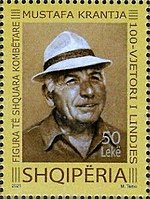| Mustafa Krantja | |
|---|---|
 Portrait of Mustafa Krantja, 1950s Portrait of Mustafa Krantja, 1950s | |
| Born | (1921-04-10)April 10, 1921 Kavajë, Principality of Albania |
| Died | January 4, 2002(2002-01-04) (aged 80) Tirana, Albania |
| Occupation(s) | Conductor, Composer |
| Era | 20th century |
| Known for | Being the first conductor of the National Theater of Opera and Ballet |
| Children | Ermir Krantja |
| Signature | |
Mustafa Krantja (10 April 1921 – 4 January 2002) was an Albanian classical music conductor and composer. He has written about 20 major works. Krantja was awarded the People's Artist award in 1956 and the Dvorak Medal in 1975.
Early life and career
After graduating from the Academy of Arts in Prague in 1950, Krantja returned to Albania and in 1951 founded the Symphony Orchestra at the National Theater of Opera and Ballet. The following decade, in 1964, he founded the Conservatory of Arts which later would become the Higher Institute of Arts, today known as the University of Arts. He was one of the initiators in the establishment of the conducting branch in the institute.
Krantja's repertoire is quite extensive, featuring more than thirty premieres of operas and ballets performed at home and abroad. The first opera he directed was "Rusalka" by Russian composer Dargomyzhsky, whose success encouraged him to dedicate himself to the beautiful and difficult path of art. The added success of the opera "The Bartered Bride" by the czech composer Smetana was also noteworthy, which he conducted with the symphony orchestras of Russia, Romania and the Czech Republic. Krantja conducted the first Albanian operas "Mrika" (1959) and "Skënderbeu" (1968), as well as the first Albanian ballet "Halili and Hajria" (1963) and many other Albanian orchestral works.
Notable works
- "Rusalka" by Dargomyzhsky (1953)
- "Ivan Susanin" by Glinka (1954)
- "The Bartered Bride" by Smetana (1956)
- "La Traviata" by Verdi (1956)
- "Iolanta" by Tchaikovsky (1957)
- "The Barber of Seville" by Rossini (1958)
- "Cavalleria Rusticana" by Mascagni (1959)
- "Mrika" by Prenkë Jakova (1959)
- Performances from operas: "The Marriage of Figaro" by Mozart, "Boris Godunov" by Mussorgsky, "Il Trovatore" by Verdi (1961)
- "Carmen" by Bizet (1962)
- "La bohème" by Puccini (1963)
- "Aleko" by Rachmaninoff (1963)
- "Les pêcheurs de perles" by Bizet (1964)
- The prologue of the opera "The Snow Maiden" by Rimsky-Korsakov (1964)
- "Rigoletto" by Verdi (1965)
- "Skanderbeg" by Prenkë Jakova (1968)
- "Commissioner" by Nikolla Zoraqi (1975)
Awards

- Order of the Working Class I & II
- Prize of the Republic Class II
- Order of "Naim Frashëri" Class I for artistic activities and for services in Albanian schools outside the political boundaries of the Albanian state.
- Title "Distinguished Artist" of the People's Republic of Albania
- Title "People's Artist" of the People's Republic of Albania
- Scientific title of "Professor"
- Medal of the 50th anniversary of liberation for contribution during the anti-fascist war (NÇL).
- Medal of Honor from the Baku Opera in Azerbaijan.
- "Permanent Honorary Member" of the International Center of Culture, Art and Literature with headquarters in the city of Brindisi (Italy) "Cikal"
- The title of "Honorary Citizen" of the town of Kavajë, Albania.
- The title of "Honorary Citizen" of the town of Cítoliby, Czech Republic.
- Commemorative medal "Dvorak" by the Ministry of Culture of the Czech Republic
References
- Nika, Leonita. "Nderohet dirigjenti i parë i operas Mustafa Krantja". ABC News. Retrieved 16 October 2021.
- Vrapi, Julia. "Ermir Krantja: Muzika shqiptare, ende në tranzicion..." sot.com.al. Retrieved 14 March 2013.
- International Who's Who in Classical Music 2003: Volume 19 of International Who's Who in Classical Music (19 ed.). Europa Publications, Routledge. 2003. p. 429. ISBN 185743174X.
- Lama, Alma (4 November 1999). "Misteri i njeriut që krijoi orkestrën e parë simfonike". Koha Jonë.
| People's Artist of Albania | |
|---|---|
| Actors | |
| Cinematographers |
|
| Dancers |
|
| Singers |
|
| Music directors and Composers | |
| Musicians | |
| Figurative Arts | |